Open Science Essentials: Towards a Skill Set and Showcases at LIBER 2019
Open science skills for research librarians and researchers are at the heart of the evolution towards openness.
LIBER’s Digital Skills for Library Staff & Researchers Working Group is supporting this transition in two ways: by building a digital skills list with a specific focus on Open Science and by highlighting Open Science training programmes relying on skills identification.
The first results of this combined approach were presented during an Open Science Essentials workshop at LIBER 2019: a follow up to the 2018 LIBER/Foster+ Workshop “Lets’ build the Skills” and complementary to the EOSCpilot & LIBER Webinar “Skills and Training in Open Science and the EOSC Ecosystem”.
Part I – Case Studies: “Open Science Skilling and Training Initiatives in Europe”
Open Science Skilling & Training Initiatives in Europe – Case Studies
LIBER’s Digital Skills for Library Staff and Researchers Working Group started, in 2018, to identify Open Science training programmes. Surveys were subsequently sent to contacts in 28 countries, and complementary interviews were conducted.
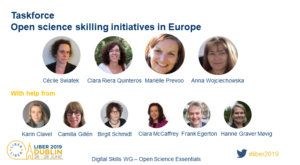
From the answers received, the group published six case studies from Denmark, Hungary, Luxembourg, Norway, Poland and Switzerland. These were presented in the first half of the workshop, in order to offer the research library community a landscape of inspiring methods, practices, contacts and words of wisdom, covering institutional cases, national initiatives as well as European project approaches.
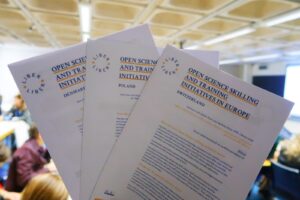
The results display the richness and diversity of European approaches towards Open Science skilling and training in both libraries and researchers’ communities, from mature programmes to emerging initiatives.
In addition, initial survey results were presented. They showed trends from the eleven first answers collected. The full survey results will be published in 2020.
Stand-ups
Ignasi Labastida (Head of the Office for Knowledge Dissemination and the Research Unit at the CRAI (Library) of the University of Barcelona) and Hanne Graver Møvig (Library Director at University of Oslo) stood up and presented their institutional cases, as example of how libraries are a vector for spreading a more open culture when they are positioned as key-partners in skills training Open Science.
Part II – Digital skills list
Skills List: Focus on Open Science & Group Discussions
In the second half of the workshop, Thorsten Meyer (Chief Librarian/Deputy Director at the Leibniz Information Centre for Economics), presented the group’s work so far on a skills list that gathers various existing frameworks and skills sets.
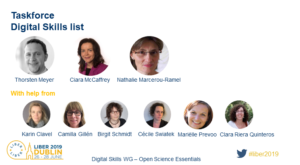
For the purposes of the workshop, this presentation focused on Open Science skills, even if the list is broader and embraces digital skills more globally. The presentation of the work-in-progress list can be seen in the workshop slides.
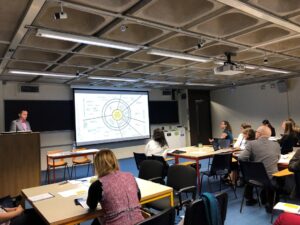
The attendees divided into small groups oriented towards specific expectations (self-skilling, skilling library staff, skilling institutional researchers) and reflected on three questions. Working Group members at each table gave feedback to the workshop audience. Ciara McCaffrey, Deputy Librarian at the University of Limerick, facilitated the discussions.
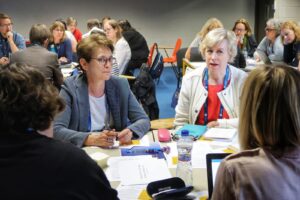
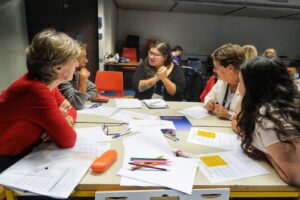
Main points of discussion (2-3 per group)
Notes taken by Vasso Kalaitzi, Head of International Projects at LIBER.
Challenges
- Institutional policies;
- New systems to evaluate research / rewards / incentives;
- Bottom-up approach: start from the library and influence the institutions;
- To convince researchers and library staff;
- To put all activities together in a framework;
- To cooperate with other groups;
- Requirements from funders;
- To convince researchers (taking into account domain);
- Time to develop new skills;
- Awareness for need of development of skills;
- Budget (size of institution/country);
- To find training material in a chaotic ecosystem;
- To persuade our institutions that training is needed.
Good Practices/examples
- Have an OS programme led by researchers but not the library – present what the library can do for you (Utrecht);
- Focus of national library on building skills of their staff (Estonia);
- Different labs to foster dialogue and build relationship;
- Hire people from other disciplines (not only librarians) and different levels, as well as employees that understand the research ecosystem;
- Digital scholarship Center / Carpentries – Framework;
- Finding champions that pull others / trainers;
- Hackathons / f2f trainings / online courses;
- Prioritising time for development;
- Sharing information / foster communication and collaboration / working groups / learning by doing;
- Ambassadors/Champions;
- Shared responsibility between individual and institution;
- Working with / taking advantage from relevant EU funded projects;
- Events involving all relevant stakeholders, incl. funders as multipliers and follow this by training, create an ecosystem of mandates, incentives and actual training.
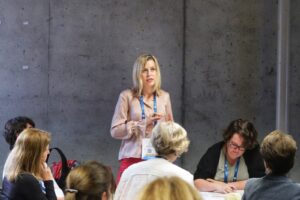
References
- Workshop Slides on Zenodo
- LIBER Digital Skills for Open Science Zotero List
- Open research Glossary
- Digcomp 2.1
- Providing Researchers with the Skills and Competencies They Need to Practise Open Science (OSPP report)
- FOSTER+ Open Science Taxonomy
- Open Science training handbook
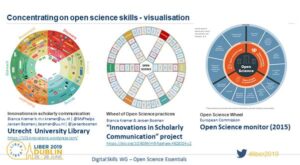
This active workshop was continued by a presentation of the SSHOC Project with a focus on Social sciences in the EOSC, in collaboration with LIBER’s Digital Humanities Working Group and DARIAH.
Related news articles